#no it really feels like the narrative is punishing mary for having sex by forcing her to settle for this rodent
Explore tagged Tumblr posts
Text
s1e7
#i think i might have to drop this show bc mary's love interest fills me w rage#YOU DONT DESERVE HER YOU HIDEOUS COMMONER INGRATE#WHY DO YOU HAVE SO MUCH SELF ESTEEM KYS#also hate his uppity mother#honestly maybe this depiction of the patriarchy is just making me irate. cora's husband being squeamish about pregnancy KILL YOURSELF#YOU MASSIVE INCOMPETENT 60 YO BABY#what even is there to root for in the mary/matthew romance. they had a few flirty conversations#thats it.#i love mary and thomas and violet but idk#downton abbey liveblog#no it really feels like the narrative is punishing mary for having sex by forcing her to settle for this rodent#where is the reallll romancderowrr
0 notes
Text
CAOS Part 3 - review
Uh, okay, so I think by now, we all know this show is terrible. Netflix gives showrunners a lot of creative freedom, and I think, for better writers, you could get some really interesting content, but they just seem to keep giving these assholes who wrote the travesty called Riverdale, so many opportunities to make more shitty television, and I feel like they really deserve to be limited in their ability to create/write if not stopped completely and thrown into a well with Julie Plec. Anyway, I’ll try to break this down as best as I can into different piles of shit and this will contain spoilers:
Characters
Prudence and Ambrose
So, to be really honest, I watch this show exclusively for Prudence and Ambrose. Because, well, look at them:
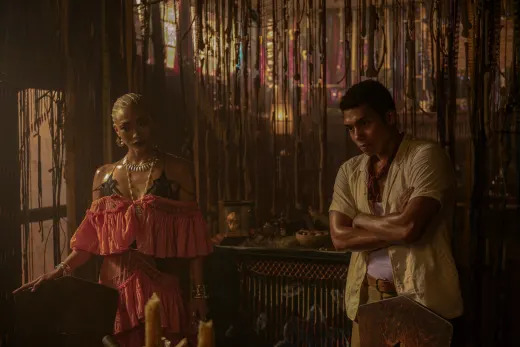
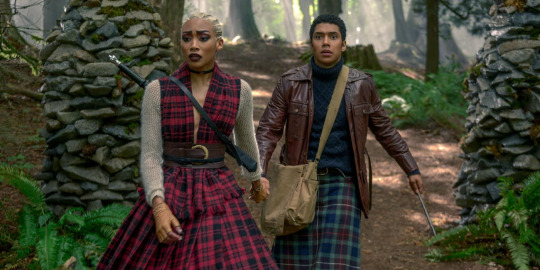
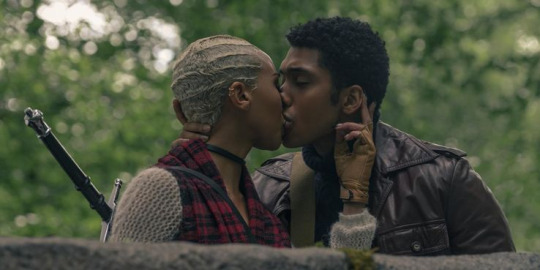
I wish they had more chemistry because they are super hot together, and I still ship it. A young Black couple? On TV? In this sea of shitty interracial relationships? I’ll take it. Anyway, of course, the progression of their relationship is ridiculous and frustrating. Ambrose decides at the last minute, not to kill Father Blackwood because he has a weird time egg thing that they don’t really understand, also he has the twins under some weird mind control for no clear reason, so they stay their hands. It doesn’t make sense, but it becomes clear, Father Blackwood has an insane amount of plot armour and ultimately would have to serve as a vessel for Satan. Father Blackwood uses the manipulated mind of the other weird sister to sic her on the coven, and she ends up killing Dorkus, whom Prudence finds. She then blames Ambrose for not allowing her to kill FB, and they break up. Now...this would kinda make sense, if not for the fact that they trapped one of the pagan witches and forced her to change everyone back, but no one bothered to do anything about the mentally ill witch who you all strapped up for a reason? Lol ok. Seems like an oversight on your part Prudence, but...okay. Clearly manufactured breakups are exhausting, especially since [young] Black couples with no serious relationship dysfunction are now an endangered species. It’s also frustrating because we barely got to see them....*be* together, especially after they returned home.
Nick & Sabrina
So, I know from the beginning, we were supposed to believe that Nick and Sabrina had that kind of, Bad Guy, seduces the girl Good Girl, luring her into the dark side, hot, intense, passionate relationship. But their lack of chemistry and really shitty acting just made them really dry (which I get into here). I don’t believe them, and I definitely don’t believe that Sabrina would, once again, break a shit ton of rules to get Nick back. I just don’t buy that they had that kind of an intense, desperately in love, kind relationship, because they do not look all that comfortable around each other, much less in love.
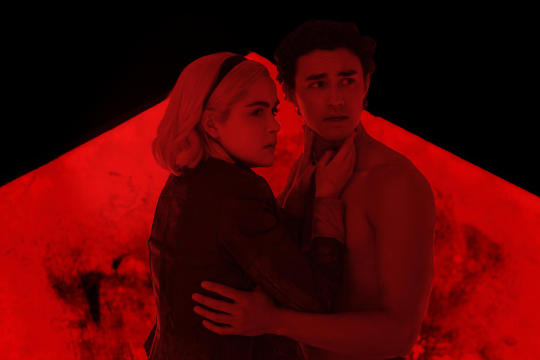

I personally find Sabrina utterly unlikeable as a main character, largely because who IS she? She has no personality, she just does whatever the plot needs her to do in the moment, and the actress makes Sabrina appear smug and unremorseful while she fucks up everyone’s lives. There is a lot of exposition of everyone telling us she’s this power hungry, manipulative character, but we never see that. She just does stuff and everyone is all “Sabrina how could you?!” and there are never, ever any consequences. I would have liked to see her push so hard to get Nick back and the struggle being, sure she wants him back, but mostly she’s doing it because she can. But that’s not what happens.
So Nick ends up in this weird drug addiction, alcohol, sex demon spiral because he has parts of Satan still in him and it all just falls so flat and lame, because this show is SO bad at pacing, and these actors suck, so nothing is believable. The idea of him scrubbing his club foot, having nightmares, suffering PTSD, is fine, the execution was trash. Nick sees Caliban and Sabrina have one interaction and he’s like WELL, GUESS I GOTTA CHEAT. And just ends up in some S&M situation with sex demons and heavily self medicating, but none of this has any weight, and we don’t really see him...spiralling. He just immediately resorts to these things and it has no real impact on anyone or even him really, and that’s it.
Harvey and Roz
Uh, they’re probably the most confusing match here, because there is no lead up to their relationship, there’s not suggestion, there’s no pacing. Just BOOM, we’re into each other now. BOOM, Roz is the only sexually active person in her friend group (lol of course the Black girl is sexually active. Gotta maintain white innocence at all costs), so she’s just ready to jump Harvey’s bones any second now. So of course, the show punishes her by having the pagans turn her to stone. And as if that’s not bad enough...
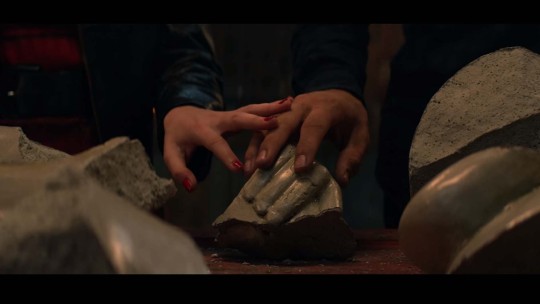
Which I talk about here and here, because honestly I’m just sick of this show’s antiblackness. Theo & that other guy
So I was watching this unfold like, yeeaahh, they’re gonna make the trans guy get with the enemy aren’t they? And yes, they did. Cool, they didn’t kill him off, but I’m still perplexed at how Theo isn’t even a little upset that this guy was basically sent to infiltrate his friend group and sat by while his people harmed Theo’s friends, and also...used him? Like...we just...are gonna...gloss over that because he changed his mind? Lol ok. Sure.
Mambo Marie and suddenly Zelda?
I...I mean her name is Mambo Marie. I love the idea of Black witches finding Black spirituality and magicks through Vodun and a Hatian Priestess. But they quickly undo that, by ensuring that Mambo Marie only teaches Prudence in the presence of these white witches. And we see her...doing...an African drum circle (eye roll), only to be interrupted by the High Priestess of White Feminism, Zelda Spellman. It quickly devolves into thinly veiled racism where Zelda doesn’t trust Marie because she’s Catholic (says the woman who worships Satan, has an anti Pope and prays to Lilith with the same prayer for Mary mother of Jesus? LOL. Not even unpacking the fact that Vodun is an African spirituality having 0 roots in catholicism WHITE WRITERS). Then suddenly, out of nowhere, Marie and Zelda are a thing for no reason? After the way Zelda treated her? Why did Marie even stay? This isn’t her problem. This is a white witch problem. Okay. That’s too much to unpack.
Plot
So, my biggest problem with almost all Netflix English programming is that they are so obsessed with aesthetics, and don’t pay enough attention to actual character chemistry, plot, story flow, details, pacing etc. Like...things that actually make stories interesting to watch. So they slap all these people together and throw them into aesthetically pleasing backgrounds, shake it up with so much exposition that nothing actually happens, and are like BEHOLD A STORY. And CAOS is *especially* guilty for this.
First of all those musical breaks were annoying as fuck. Musicals serve 2 story functions: advancing the plot or telling a story. These musical numbers did neither and were honestly ridiculously gratuitous, highly annoying and totally pointless.
What time of year is this? Why are we having pep rallies and how the fuck and when did Sabrina and Roz join the cheeleading squad, and why?
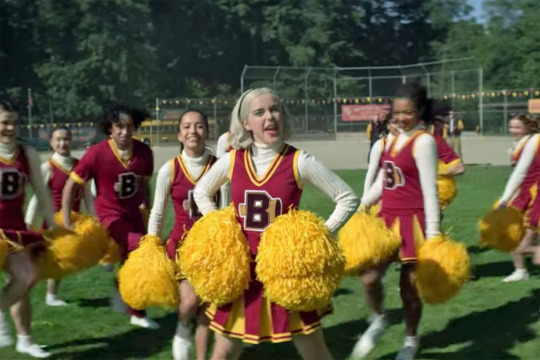
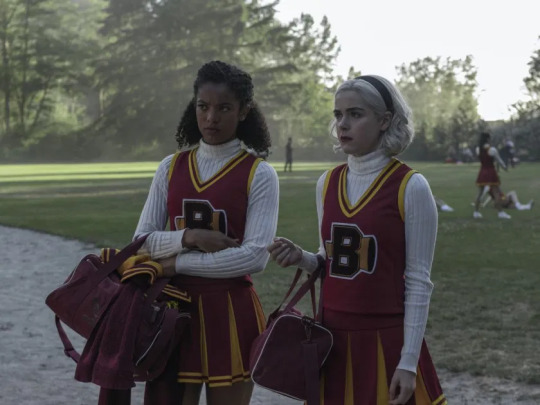
for the aesthetics and not for any real plot reason. It just seems stupid because now I don’t know how much time has passed between Nick going to hell and this, because you’re all handling it like it’s been a few weeks and is still relatively fresh, but suddenly, Theo, Harvey and Roz are in a garage band? You’re a cheerleader? For what? Since when? Why? These choices introduce more questions than they answer and serve no narrative purpose. So much wasted time on shit that doesn’t matter.
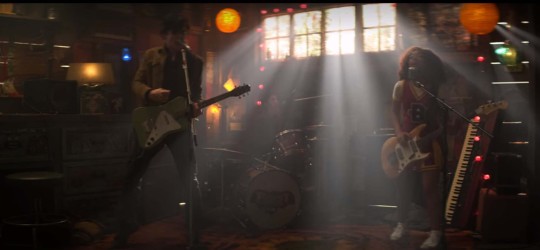
Sabrina is supposed to be fighting Caliban (who is literally the only person she has chemistry with on this show and they killed him bc ofc they did), for her seat on the throne, and yet the trials only seem to come up when it’s convenient, and also seem to be directly related to her dealings with her coven, which is also convenient. I’m so confused about Satan. His powers come from being a celestial being, and so, because his coven mistreats him he’s like...lol okay, well fuck you guys and goes through all these convoluted small motions to greatly inconvenience them and withdraws his powers? This is so petty and pathetic. Also, what’s the point? He could just wipe them out and start over, instead of skulking around inside FB then suddenly decides to track down Lilith. Again, convoluted. This plot is all over the place. Why does Satan need Sabrina to be Queen of Hell in the first place? He seems perfectly healthy. Why can’t he just rule it? Like...that makes no sense. What is he gonna do? Retire? WHAT is going ON?
How did Sabrina come back in time to herself stuck in stone? Is that trip to Pontius Pilate (lol) supposed to have created a loophole for her to save herself and everyone? This is giving me hardcore Twilight Breaking Dawn vibes, where, the show finally, FINALLY gets interesting, there’s real stakes, shit is actually happening instead of everyone talking about things happening (Hilda ending up killing her fiance was literally the only time I felt something watching this show because it was genuinely sad, and well acted, and Hilda coming through with that doll at the end was pretty disturbing, I’ll give them that), and ofc, Sabrina goes back in time and undoes it all. Lol. Okay. God forbid there be real consequences to anything on this show.
Final thoughts
Once again, the white feminism runs high on this show. They treat this Black Vodun Priestess Marie, like garbage, allude to her “foreign” magic, but Marie is sitting here like “we’re not men, we’re women, let’s work together.” This is why I hate white writers writing for Black characters. Black characters should have Black motivations, and a Black Vodun Priestess, should know that white women and Black women do not have aligned motivations just because they share a gender. Once they started with the bullshit right from her arrival, she should have handed Prudence her card and peaced tf out. Instead she tolerates the isolation, ostracization and thinly veiled racism...and decides to stay, and help. WHY? Marie has gained nothing by sticking around helping these ungrateful ass witches. I honestly would have preferred Prudence asking her to stay to learn more about Vodun, and them building a mentor/mentee type of relationship, especially since Prudence was the one who invited her and stepped to Zelda to defend her. I want(ed) to see that relationship go somewhere. The deliberate denial of healthy Black female friendships on tv is frustrating.
These witches finally finding their power in their ancestors and I donno, some female creator or whatever, reminds me of white women “finding” wicca and praying to “Gaia”, (reminds me of BTVS s4 when Willow joins the wicca group) which is basically what happened but lol okay whatever. I guess they aren’t satanic witches anymore. Lol, I love how Harvey and Roz and Theo are teenagers, human teenagers, who have lead largely normal teenage lives up until this point, but see their loved ones tortured, deformed or murdered in hell, with basically no residual issues, and are all like, YES, let’s roll up on these adults with shotguns and swords and kill the FUCK outta these people!! That absolutely sounds normal! Like...what? Lol. God this is just so bad.
Also, I’m so confused by this aesthetic choice for Sabrina as Queen of Hell. Like what the fuck. Why is she dressed like a Victorian era queen, with shoulder and a broken rib bodice? What?!
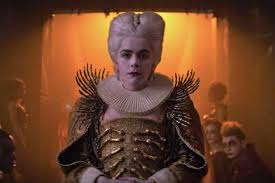
This show is truly awful, this season made no more sense than the last two and now that Prudence and Ambrose aren’t together, I might be done watching.
-20/10
#caos season 3#caos part 3#caos prudence#prudence x ambrose#prudence night#ambrose spellman#the chilling tales of sabrina#sabrina spellman#caos spoilers#long post#caos review#rosalind walker#mambo marie#zelda spellman#hilda spellman#harvey kinkle#theo putnam
139 notes
·
View notes
Note
How was LGBT stuff back in those days?? Gender wise and sexuality
what portion of pirates do you think were lgbt? ( @justificd )
pirate historian ama | anonymous | @justificd
I’ve been wrestling with exactly how to answer this, because the truth is, there is no right answer. I know there’s a lot of guff about the whole “they were very close friends” bullshit when two dudes or gals were veeery obviously into each other, and I can tell you younger historians are getting a lot better about this, but you’re going to start seeing the words “possibly” and “probably” a lot. But I’m also going to explain why this is, and give you a peek into how we do things, if you don’t already know. The problem with quantifying lgbt in an early modern historical context is the fact that even the idea of being lgbt didn’t exist yet. We folks who are Definitely Not Straight have always existed, but how we’ve thought about ourselves has changed so much over time, and only just now, in the modern era, are we truly putting labels to things to better identify ourselves, because the idea of lgbt is a very, very modern one. Our not hetero asses - always been here. Labeling ourselves - very new.
So when we sit down and write about people and things, what we mainly do is strip away modern connotations we might try to put upon it, and any biases and morals and ideals we have because it’s not important how we view people in the past, as far as history is concerned. What is, honestly, is how they viewed themselves. And if you met someone who was very gay in the 18th Century, they would not apply that label to themselves, because it would not fit their world view. So we avoid saying definitely because they didn’t have the vocabulary to describe themselves, nor did they have the ideals yet to do so, and to us it’s slanting the narrative to slap a label on them because we could be wrong. That woman we think might have been a lesbian? She might have been pan. And we genuinely don’t want to mislabel and force what is basically history headcanon on someone that it might not apply to. We write about people in their context, not ours.
That out of the way.
So sodomy was an offense punishable by death. It might be the age of reason, but churches still hold a lot of sway, and there are still many laws with heavy religious context. The early modern period was not friendly to what we would think of as lgbt folks now. But the thing is, you weren’t thought of as, say, a homosexual, but as someone who participated in homosexual acts. The world view was heteronormativity with some people slipping off the track now again. The ideas of being lgbt and anything other than cis simply wasn’t formed at this point in time, so you can’t definitively point at anything and say yes. This is a trans person. Which sucks, because I’m pretty sure there were plenty of trans and genderfluid and gender queer people throughout history because literally there are things that are neon signs that say YES PROBABLY but applying a modern label (in an academic sense) is something we just can’t do. But I can tell you there were plenty of lesbians, plenty of bisexuals, plenty of ace folks, plenty of gay folks, plenty of trans folks, plenty of everything we have right here and now in what we have, at best guess, assumed is proportionate numbers to now. I have my feelings, for example, on Anne Bonny and Mary Read, and also both of them and Jack Rackham. But I can’t definitively back that argument up in an academic sense - I can’t make it falsifiable - enough to to charge full steam ahead anywhere but here. Yet. But the point is I imagine you’d see a representation much like we have now, just in smaller numbers due to population differences. It’s no secret that sailing did attract what we think of as bisexual and gay and pan men, because it wasn’t explicitly accepted, but it was common for sexual and even romantic relationships between shipmates. There’s really no difference in numbers or proportion from real world averages, however, as nearly as we can figure, from the population as a whole.
This is sailing as a whole, and it pretty much holds true for piracy, as well, because piracy attracted all kinds regardless of gender or sexual orientation. These were people who were looking to make a lot of money fast, and Idk about you guys, but I am a very pansexual person who would also like to make a lot of money very fast. Sex between shipmates? Yeah, it totally happened. Romantic relationships? Yep. There’s a lot of talk about matelotage being gay marriage, and in some cases it was, and in some cases it was a platonic agreement, and in others something completely different. But it most definitely was marriage in some circumstances, much like how some straight marriages in this time period were simply an agreement between a man and a woman to shack up until one of them kicked it.
I hate that I can’t give a better, more definitive answer, but the truth is, while we’ve always been here, as far as numbers? We just don’t know. People simply didn’t identify themselves that way, and so it makes our job that much harder because we don’t want to mislabel and get the narrative wrong. But, again, while it was very much not a thing you’d ever really be open with because of laws against it that could get you dead if convicted, our best guess is that proportionately it’s always been the same across the board.
#anonymous#hard time killing floor blues | answered#in hell i'll be in good company | ooc asks#half the things you've been taught in school are just convenient fictions | history#// historical lgbt
8 notes
·
View notes
Text
Bohemian Rhapsody Review
There's a scene in "Bohemian Rhapsody" I keep coming back to, because it's symbolic of the film's problems, not just with its presentation of Queen, but of Freddie Mercury, the legendary lead singer and the greatest frontman of all time. (I'd say "arguably" but for me there's no argument.) One night, Freddie Mercury (an extraordinary Rami Malek), missing the excitement of touring, throws a costume ball in his mansion. Dressed in an ermine cloak and a crown, he swings through the crowd, made up of men in various degrees of fabulous drag. The other members of Queen—lead guitarist Brian May (Gwilym Lee), drummer Roger Taylor(Ben Hardy), and bassist John Deacon (Joseph Mazzello)—sit together, visibly uncomfortable. Freddie greets them rapturously, and one of them says stiffly, "This isn't really our scene, Freddie." Later that night, Freddie hits on a waiter named Jim (Aaron McCusker), who rebuffs him, saying, "Call me when you like yourself."
The more I think about this scene—the problems of which could fill an entire dissertation—the angrier I get. "Bohemian Rhapsody"—written by Anthony McCarten ("The Theory of Everything", "Darkest Hour") and directed by Bryan Singer (with uncredited director Dexter Fletcher, who took over after Singer was fired)—wants me to watch the costume ball scene and think, "Wow, I'm scared for Freddie. Freddie needs the stability of his (married, straight) band members to counteract the SUPER gay world he's living in." I struggled with this scene, I tried to give the filmmakers the benefit of the doubt. But what's onscreen is what is intended. We are meant to side with the band members, we are meant to look at Freddie with the same discomfort about him acting so, well, gay. It's unforgivable.
Opening and closing with Queen's triumphant performance at Live Aid in 1985, the film shows (sort of) the transformation of shy buck-toothed Farrokh Bulsara, the closeted son of Parsis parents, into the strutting swaggering Freddie Mercury. Freddie is shown approaching a band he likes backstage at a club in London. They just lost their lead singer, and Mercury has written a song he wants to show them. Next thing you know, he makes his debut with them, and, except for one catcall of "Paki," Freddie and his flamboyant movements goes over really well. Next thing you know, they're Queen, and they're touring the world. In the film, their artistic journey is boiled down into on-the-nose statements like, "We'll mix genres and cross boundaries!" Do rock stars speak like this? The genesis of some of their biggest hits—"Bohemian Rhapsody," "Another One Bites the Dust," "We Will Rock You"—are treated in a cursory manner, with very little insight provided into an actual creative process.
Biopics tend towards the "sensational," making the mistake of thinking that the most interesting thing about James Brown, for example, is his personal life, when why we care about James Brown is his music. "I Saw the Light" was far more interested in Hank Williams' drug addiction than in what he actually did in country music that was so groundbreaking. Some films—like "Love & Mercy" and "I'm Not There"—move away from the biopic approach altogether, and attempt to grapple with the subject matter as artists. The artistic commentary in "Bohemian Rhapsody" tends towards a knowing wink-wink at the audience. "Nobody wants to listen to a six-minute opera song with words like 'Galileo' in it!," cries one record label executive (played by Mike Myers in a bit of meta-casting, calling up the "Bohemian Rhapsody" scene in "Wayne's World.")
"Bohemian Rhapsody" is bad in the way a lot of biopics are bad: it's superficial, it avoids complexity, and the narrative has a connect-the-dots quality. This kind of badness, while annoying, is relatively benign. However, the attitude towards Mercury's sexual expression is the opposite of benign. The tensions of being a gay man in the 1970s are not handled, or even addressed. He himself seems unaware of his own sexual desires. He falls in love with Mary Austin (Lucy Boynton), and looks shocked and disturbed when a trucker gives him a seductive side-eye at a restroom in middle America. (Fade to black. We never see what happened next.) Later, Mary says to him, "You're gay, Freddie," and he responds, "I think I'm bisexual." That's as far as the conversation goes. The film is rated PG-13, so there's not much sex in it anyway, but he's shown in a romantic context only with Mary.
There's no other word for this approach than phobic. The relationship with Mary was hugely important to Mercury (he left his estate to her in his will), but the subtleties of the situation and the context of what it would mean to "come out" in the 1970s are not explored at all. The script makes it seem like Mercury had no desires for homosexual sex until Paul Prenter (Allen Leech) came along and showed him the way.
Paul, manipulative, cunning, controlling, lures Mercury into the gay underworld of leather clubs and orgies, far away from the goodness, the wholesomeness, that is the rest of Queen. Prenter—who also died of AIDS in 1991—eventually gave very damaging interviews following his breakup with Mercury. But "Bohemian Rhapsody" shows no interest in contextualizing what Paul, a self-described "queer Catholic boy from North Belfast," may have represented to the closeted Mercury, why Freddie was drawn to him. Maybe Freddie was sick of hanging out with his straight married friends and needed some "gay time." Nobody knew AIDS was coming. The people in those clubs weren't just biding their time in an orgy of self-loathing until a biblical plague was visited upon them. They were having a blast. A long-overdue blast. But you'd never know that from the film. "Bohemian Rhapsody" views Paul as a villain and AIDS as a punishment.
None of this is the fault of Rami Malek, whose imitation of Mercury goes beyond the famously prominent teeth. He taps into Mercury's ferocious energy, particularly in the concert sequences, all of which give you the electric sense of what it might have been like to be there in person. The single star of this review is for Malek's performance.
The film's reluctance to deal with Mercury's sexuality is catastrophic because his sexuality is so connected to the art of Queen that the two cannot be separated out. Refusing to acknowledge queerness as an artistic force—indeed, to point at it and suggest that this is where Mercury went astray—is a deep disservice to Mercury, to Queen, to Queen fans, and to potential Queen fans. Genius doesn't emerge from a vacuum. Mercury was made up of all of the tensions and passions in his life: he loved Elvis, opera, music hall, costumes, Victorian England ... and, yes, sex. Lots of it. Sexual expression equals liberation, and you can feel the exhilaration of that in Mercury's once-in-a-generation voice. You cannot discuss Freddie Mercury without discussing the queer sensibility driving him, the queer context in which he operated. Or, you can try, as this film does, but you will fail.
0 notes
Text
Bohemian Rhapsody
There’s a scene in “Bohemian Rhapsody” I keep coming back to, because it’s symbolic of the film’s problems, not just with its presentation of Queen, but of Freddie Mercury, the legendary lead singer and the greatest frontman of all time. (I’d say “arguably” but for me there’s no argument.) One night, Freddie Mercury (an extraordinary Rami Malek), missing the excitement of touring, throws a costume ball in his mansion. Dressed in an ermine cloak and a crown, he swings through the crowd, made up of men in various degrees of fabulous drag. The other members of Queen—lead guitarist Brian May (Gwilym Lee), drummer Roger Taylor (Ben Hardy), and bassist John Deacon (Joseph Mazzello)—sit together, visibly uncomfortable. Freddie greets them rapturously, and one of them says stiffly, “This isn’t really our scene, Freddie.” Later that night, Freddie hits on a waiter named Jim (Aaron McCusker), who rebuffs him, saying, “Call me when you like yourself.”
Advertisement
The more I think about this scene—the problems of which could fill an entire dissertation—the angrier I get. “Bohemian Rhapsody”—written by Anthony McCarten (“The Theory of Everything“, “Darkest Hour“) and directed by Bryan Singer (with uncredited director Dexter Fletcher, who took over after Singer was fired)—wants me to watch the costume ball scene and think, “Wow, I’m scared for Freddie. Freddie needs the stability of his (married, straight) band members to counteract the SUPER gay world he’s living in.” I struggled with this scene, I tried to give the filmmakers the benefit of the doubt. But what’s onscreen is what is intended. We are meant to side with the band members, we are meant to look at Freddie with the same discomfort about him acting so, well, gay. It’s unforgivable.
Opening and closing with Queen’s triumphant performance at Live Aid in 1985, the film shows (sort of) the transformation of shy buck-toothed Farrokh Bulsara, the closeted son of Parsis parents, into the strutting swaggering Freddie Mercury. Freddie is shown approaching a band he likes backstage at a club in London. They just lost their lead singer, and Mercury has written a song he wants to show them. Next thing you know, he makes his debut with them, and, except for one catcall of “Paki,” Freddie and his flamboyant movements goes over really well. Next thing you know, they’re Queen, and they’re touring the world. In the film, their artistic journey is boiled down into on-the-nose statements like, “We’ll mix genres and cross boundaries!” Do rock stars speak like this? The genesis of some of their biggest hits—”Bohemian Rhapsody,” “Another One Bites the Dust,” “We Will Rock You”—are treated in a cursory manner, with very little insight provided into an actual creative process.
Biopics tend towards the “sensational,” making the mistake of thinking that the most interesting thing about James Brown, for example, is his personal life, when why we care about James Brown is his music. “I Saw the Light” was far more interested in Hank Williams’ drug addiction than in what he actually did in country music that was so groundbreaking. Some films—like “Love & Mercy” and “I’m Not There“—move away from the biopic approach altogether, and attempt to grapple with the subject matter as artists. The artistic commentary in “Bohemian Rhapsody” tends towards a knowing wink-wink at the audience. “Nobody wants to listen to a six-minute opera song with words like ‘Galileo’ in it!,” cries one record label executive (played by Mike Myers in a bit of meta-casting, calling up the “Bohemian Rhapsody” scene in “Wayne’s World.”)
Advertisement
“Bohemian Rhapsody” is bad in the way a lot of biopics are bad: it’s superficial, it avoids complexity, and the narrative has a connect-the-dots quality. This kind of badness, while annoying, is relatively benign. However, the attitude towards Mercury’s sexual expression is the opposite of benign. The tensions of being a gay man in the 1970s are not handled, or even addressed. He himself seems unaware of his own sexual desires. He falls in love with Mary Austin (Lucy Boynton), and looks shocked and disturbed when a trucker gives him a seductive side-eye at a restroom in middle America. (Fade to black. We never see what happened next.) Later, Mary says to him, “You’re gay, Freddie,” and he responds, “I think I’m bisexual.” That’s as far as the conversation goes. The film is rated PG-13, so there’s not much sex in it anyway, but he’s shown in a romantic context only with Mary.
There’s no other word for this approach than phobic. The relationship with Mary was hugely important to Mercury (he left his estate to her in his will), but the subtleties of the situation and the context of what it would mean to “come out” in the 1970s are not explored at all. The script makes it seem like Mercury had no desires for homosexual sex until Paul Prenter (Allen Leech) came along and showed him the way.
Paul, manipulative, cunning, controlling, lures Mercury into the gay underworld of leather clubs and orgies, far away from the goodness, the wholesomeness, that is the rest of Queen. Prenter—who also died of AIDS in 1991—eventually gave very damaging interviews following his breakup with Mercury. But “Bohemian Rhapsody” shows no interest in contextualizing what Paul, a self-described “queer Catholic boy from North Belfast,” may have represented to the closeted Mercury, why Freddie was drawn to him. Maybe Freddie was sick of hanging out with his straight married friends and needed some “gay time.” Nobody knew AIDS was coming. The people in those clubs weren’t just biding their time in an orgy of self-loathing until a biblical plague was visited upon them. They were having a blast. A long-overdue blast. But you’d never know that from the film. “Bohemian Rhapsody” views Paul as a villain and AIDS as a punishment.
None of this is the fault of Rami Malek, whose imitation of Mercury goes beyond the famously prominent teeth. He taps into Mercury’s ferocious energy, particularly in the concert sequences, all of which give you the electric sense of what it might have been like to be there in person. The single star of this review is for Malek’s performance.
The film’s reluctance to deal with Mercury’s sexuality is catastrophic because his sexuality is so connected to the art of Queen that the two cannot be separated out. Refusing to acknowledge queerness as an artistic force—indeed, to point at it and suggest that this is where Mercury went astray—is a deep disservice to Mercury, to Queen, to Queen fans, and to potential Queen fans. Genius doesn’t emerge from a vacuum. Mercury was made up of all of the tensions and passions in his life: he loved Elvis, opera, music hall, costumes, Victorian England … and, yes, sex. Lots of it. Sexual expression equals liberation, and you can feel the exhilaration of that in Mercury’s once-in-a-generation voice. You cannot discuss Freddie Mercury without discussing the queer sensibility driving him, the queer context in which he operated. Or, you can try, as this film does, but you will fail.
Advertisement
Source: https://bloghyped.com/bohemian-rhapsody/
0 notes